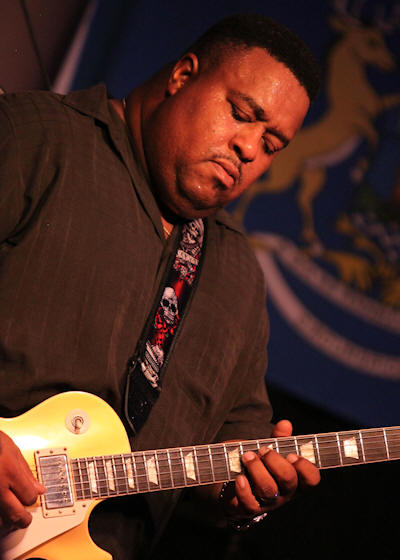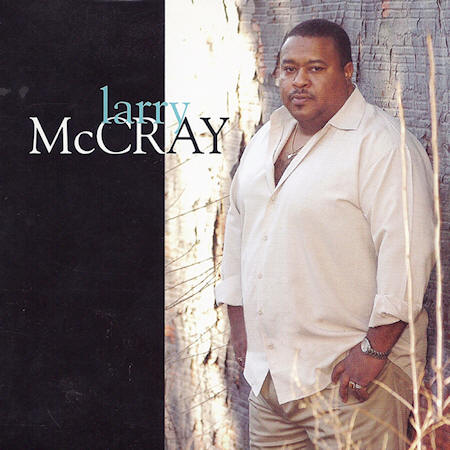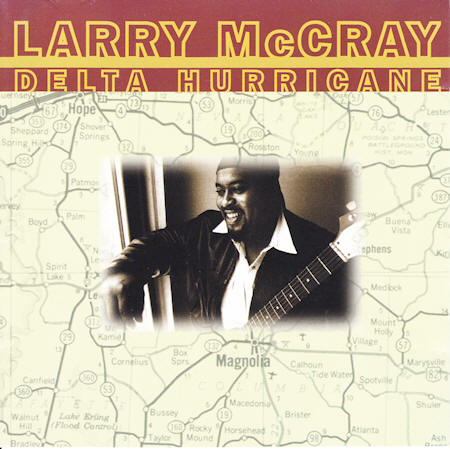
Painting © 2004 Loz
Arkle
Website
© Copyright 2000-2011 Alan White - All
Rights Reserved
Site optimised for Microsoft Internet Explorer
Early Blues Interview
|
|
|
_________________________________________________________________________ I had the pleasure of meeting Larry at The Bronte Blues Club, Keighley. Alan: What were your first musical memories growing up in Magnolia, Arkansas? Larry: I was born in a town called Stephens but we moved when I was about 5 years old to the Magnolia/McNeil area which was about 40 miles away. My first musical memories are my father playing and entertaining at home on the back porch, just getting down to it, and when we started listening to recorded music, in the early to middle 60s, I remember some of the records we had at home were Muddy Waters, Little Walter, Guitar Gabriel, Guitar Slim, Slim Harpo, you know, it was all blues music but then it transcended into what was then R&B. I was a big fan of Junior Walter, he was one of my all time favourite instrumentalists, the way he played his saxophone with a lot of that intensity that I like to try to bring to the guitar Ė not that Iím trying to do Junior's thing, but you know what I mean, that was inspirational for me!
Alan: As a teenager you moved from Arkansas to Michigan and you got a job at General Motors. Did you always want to become a musician? Larry: I loved music, but I never in a million years thought that Iíd ever get to make a recording. I didnít aspire or try to become a musician, it just kinda fell into my life. I was playing for myself and thatís kinda the way my family was, where we grew up there was nothing else to do for entertainment. I remember when we got electric lights, honestly, running water, that kind of thing. We grew up in a very rural rustic place that didnít even have running water or electric lights when I was coming up in the 60s in Arkansas. No holds barred! Alan: How did you then get started in a full time music career? Larry: After I started playing guitar my older brother picked up bass guitar about a year and a half later, and then about 5 years after that my younger brother took up the drums, so when I got bass and drums we had a trio, so we would practice at home, right above my motherís and fatherís bedroom, rattling the building, and we started learning popular music and got enough music together to be able to play. Our first gig together with this friend of ours who decided to get married and he hired us for his wedding band. Alan: What would you say first attracted you to the blues and what does the blues mean to you? Larry: I was singing before I learned how to play. I donít know man, the blues just ate me up from a small age, from when I was a little kid in school my musical preferences were always different to other kids who were my age. They were like, ďWhat are you listening to?Ē, ďWhatís that?Ē but I moved to Michigan so they didnít understand it but from the south that was a way of life and everybody spoke that language and I never strayed far away from it; I was hooked on the emotional side of the music. Mahalia Jackson was a big influence, anything that stirred emotion it hit me to the heart and thatís why I held on to the blues. I couldnít feel nothing from a lot of the other music, I mean I learned to accept and embrace other music as I got older and mature but prior to that I was a blues baby.
Larry: It wasn't that I played a lot of it when I was younger. Religion was always a very serious thing in my household and my mother always said that if you werenít trying to live a pure life or if you not doing the right things then donít go hypocriting, you know, donít go just to sing and have fun. So I never felt worthy of getting totally involved in that kind of situation so after I got grown here in the last 15 years Iíve had some experiences where Iíve been invited to big musical churches. Thereís one down in Charlotte, North Carolina, called Lake Forest where they have 2,000 members and they have state of the art everything in terms of video and audio production and they have different themes every so often, maybe three or four times a year they will have a musical theme, and they will invite contemporary or secular audience in to perform their music but you also perform with the church band which is gospel music. So that was one of the greatest experiences that I have had musically because it is so fulfilling to see the sincerity of people and the power of music, what the music does for them, and the appreciation and the love that you get back for giving a little bit. Alan: Whoís influenced you most in your music writing and playing? Larry: I had a lot of musical influences growing up and when funk music became king. With Sly and The Family Stone I got turned on to slide right about í68 or í69 when the album 'Stand!' came out. I learned about Larry Graham, Sly Stone and funk music was real popular until the late 70s when disco came in. So I always saw funk music as being 'souped-up' blues music anyway, the rhythm was different but the vocal lines, the guitar, the keyboards was playing blues with a beat that was just unbelievable so my vision was to take this music, fuse it with this, fuse it with that, and youíve got something different. When Robert Cray came out with his style I noticed that Robert played a lot of open chords which was not really very prevalent in blues music, we called it white chords or country chords, but the way he rounded things you know. I already had the Funk, but I took his example in terms of using open chords and used colour chords too. It was always a disrespectful thing that most of the blacks, my friends, they laughing, so it was an insult to me that they tortured that music, so I wanted to find a way to bring it to the forefront, to keep the same heart and soul for the music but also to find a way that people of the modern times could relate to it and the only way you could do that was to give them something they are familiar with, something they could get hold of. Alan: In the year 2000 you co-established your own record label, Magnolia Records, with your manager Paul Koch. How did that come about? Larry: Because I had such bad luck with the labels. I signed with Point Blank Records originally in 1990, then it was House of Blues, then it was Platinum, then it was Atomic Theory and so I ran through a few labels early on, but the problem was they would always find criticisms of the music and they would always find excuses why not to promote your music and bring it to the forefront, and there were bad experiences money-wise and royalty-wise. I thought when I got involved that if you got a major label behind you then you were in business together and that they would look after you and make sure everything was done fairly. When I found out the real deal, you know there was nothing fair about it. I had signed away all my publishing rights, all of everything I own, so when I found out I was being screwed I had to break away. I had to find a way to get out of my contract, so the only alternative I had was do it on my own. Itís still like that but I donít miss the controlling aspect of the larger labels, but itís very hard to promote yourself properly if you donít have huge dollars. But they werenít giving us any promotion anyway so you might as well take it on your own. In terms of records sales, selling 20,000 independently is probably like selling 200,000 on a major label.
Alan: Also in 2000 you were honoured as the
'Orville Gibson Male Blues Guitarist of The Year' Larry: Quite an honour! I didnít believe it, and didnít know whether to take it serious but you know it never came for a couple of years!! And to see some of the people who have got it since and how they are regarded, itís a serious thing. It was a great thing but I never believed anything good could happen for me in my career so it was always overwhelming. Is this for real? Is this really the deal ... you know. It was quite amazing, yeah. Alan: Are there any songs that youíve written that have special meaning for you? Larry: On this last record, I almost resolved a long term relationship with my lady and we got it back together. We took a separation and it was very good for me because it inspired a lot of songs, 'Broken Promises', 'Big Black Hole', 'You Are the One'. When I write I try to write in conversation and I try to write about a scenario that is not so direct and could apply to anyone but anyone who knows you would know what you were talking about. That is the only CD where I have tried to write about my own life.
Larry: Well, my absolute favourite guitar for many many years was the Gibson Flying V and one day a bell went off in my head saying, ďHey, are you in control of this instrument or is it in control of you?Ē I used to be to the point where I thought I couldnít play at all if I didnít have my Flying V and I thought what if something happens to it will I be able to continue? So I started to wean myself away from that and look on it, not as a favourite instrument, but as a tool in an arsenal, so my favourites are the Gibson Flying V and Les Paul. Iím a strict Gibson player because Gibson Guitars I think are the greatest guitar company in the world. They have helped communities and artists who are less fortunate than the big pop audiences and I think thatís a straight-up move on their part. I want to be associated with Gibson because I do believe in their product. Alan: Living in the Detroit/Chicago area you grew up within a great music scene; how would you describe the blues scene there now? Larry: It's evolving because many of the older masters are falling off. We lost Johnny Bassett from Detroit about a month ago and Johnny taught so many people in that area how to play the blues and so we have a lot of young artists who are coming along now, second generation artists that are trying to carry the torch, but itís changed a lot. I donít consider myself a traditional artist but I hope that within my style they can see or feel the tradition in the soul of the music that we portray. We try to do something different because we want to grow as a band but by the same token I hope that people hear and feel that we havn't left the blues, and I think thatís true of a lot of artists there. Alan: On your 2nd album Delta Hurricane you did a great rendition of Warren Haynes' beautiful 'Soul Shine', which I first heard sung by Earl Thomas when he appeared at the Carlisle Blues Festival. Now you're back here in November at the Carlisle Blues Festival, will you be singing it there as it goes down so well with the audience? Larry: Yes, Sir. It means a lot to me because I was lucky enough to be the first one to publish the song. It has a theme and a meaning that is soulful to everybody. It's sad to say I have performed it at many funerals of family and good friends. If I'm home and something bad happens you get asked by friends to sing it, so how can you refuse? It can be kinda hard sometimes in situations like that. But also, when everything is happy it can also be uplifting. Alan: Your cousin, the late lamented Michael 'Iron Man' Burks came to the UK in 2010 playing just two gigs, one was the Carlisle Blues Festival where I was lucky enough to do a rare interview with him [Click here for Michael Burks Interview]. You've travelled a parallel path, from Magnolia/Camden area of Arkansas to the north Detroit/Chicago area and now Carlisle, UK!! Larry: His father and my sister had a band, and we had so many similarities, it's as if we were just cut from the same cloth. I would get a chance to stay with him sometimes, but every time we got a chance to play together and be together it was always something special and I think that in my home area there are some of the best guitarists and sometimes I forget he's gone until I think about it. The week that Michael passed I was in Memphis waiting on him to return and I got a telephone call from my brother to say he had passed. So the lesson learned is you have to take advantage of what's before you right now. We're not guaranteed tomorrow. Alan: Larry, thank you very much.
_________________________________________________________________________
Check out new video footage on PBS in the USA _________________________________________________________________________
Return to
Blues Interviews List |








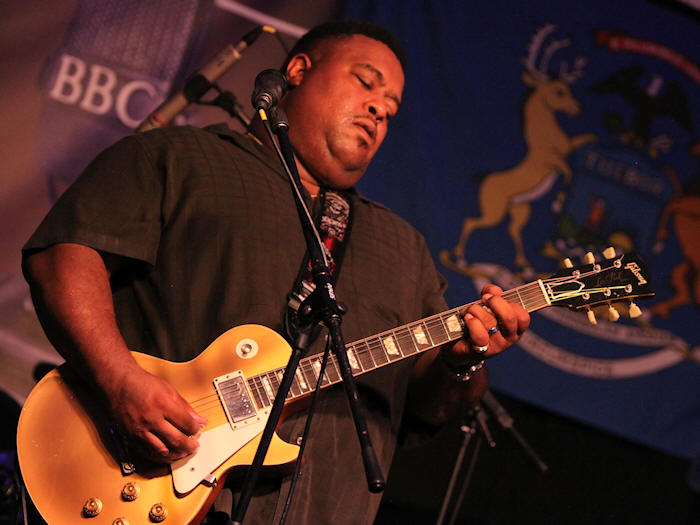
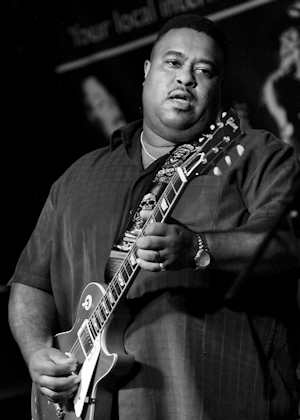 My
sister played guitar as well, her and Michael Burks' father had a band
together and she played and sang in a couple of gospel groups on Sundays
and they always rehearsed at our place, for whatever reason. So it was
straight-up blues music, then it moved R&B / Soul music, at that time it
was Junior Walker, Gladys Knight, Aretha Franklin. My first recorded
guitar experience was BB King so I learned all the BB King chops I could
learn and when Iíd learned to play them then I started stretching for
other things to expand my knowledge. So BB King, Freddie King, Albert
King, and Albert Collins Ė that was the electric guitar bible for me
growing up, and when I became a teenager I found out that I liked jazz
music too. I really liked Jimmy Smith, Jimmy McGriff, Kenny Burrell and
it went from that to George Benson then I learned about Eric Carlton,
Larry Coryell, so I was just a kid that loved music and I was hungry to
learn anything I could. I never missed the Hee Haw Show [American
television variety show], I never missed the Porter Wagner show
[American musical variety show that launched the career of Dolly
Parton], and I drew inspiration from all of that, from country
music, to blues, to jazz, and then in my 20s I started getting
interested in rock. I just loved getting anything interested in
anything good, anything that took skills to play and sounded like they
knew what they was doing. I was a big Roy Clarke and Glen Campbell fan,
they were some of my favourites growing up, I loved the way they played.
My
sister played guitar as well, her and Michael Burks' father had a band
together and she played and sang in a couple of gospel groups on Sundays
and they always rehearsed at our place, for whatever reason. So it was
straight-up blues music, then it moved R&B / Soul music, at that time it
was Junior Walker, Gladys Knight, Aretha Franklin. My first recorded
guitar experience was BB King so I learned all the BB King chops I could
learn and when Iíd learned to play them then I started stretching for
other things to expand my knowledge. So BB King, Freddie King, Albert
King, and Albert Collins Ė that was the electric guitar bible for me
growing up, and when I became a teenager I found out that I liked jazz
music too. I really liked Jimmy Smith, Jimmy McGriff, Kenny Burrell and
it went from that to George Benson then I learned about Eric Carlton,
Larry Coryell, so I was just a kid that loved music and I was hungry to
learn anything I could. I never missed the Hee Haw Show [American
television variety show], I never missed the Porter Wagner show
[American musical variety show that launched the career of Dolly
Parton], and I drew inspiration from all of that, from country
music, to blues, to jazz, and then in my 20s I started getting
interested in rock. I just loved getting anything interested in
anything good, anything that took skills to play and sounded like they
knew what they was doing. I was a big Roy Clarke and Glen Campbell fan,
they were some of my favourites growing up, I loved the way they played.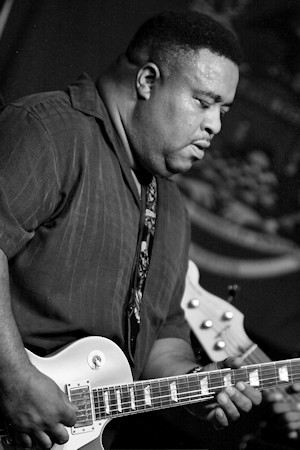 Alan:
You mentioned Mahalia Jackson, so what other gospel influences did
you have?
Alan:
You mentioned Mahalia Jackson, so what other gospel influences did
you have?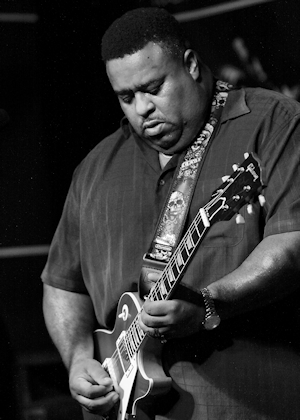 Alan:
Youíve been collecting guitars for many years, Gibson, Les Paul,
Fender Ė which is your favourite?
Alan:
Youíve been collecting guitars for many years, Gibson, Les Paul,
Fender Ė which is your favourite?